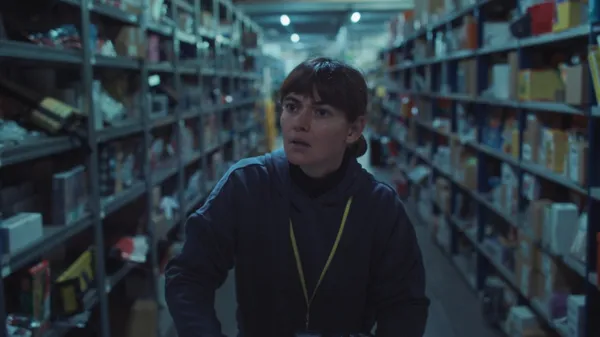Eye For Film >> Movies >> On Falling (2024) Film Review
On Falling
Reviewed by: Amber Wilkinson

The transient space of Scotland’s gig economy provides the backdrop for Laura Carreira’s accomplished debut feature. By tackling big themes of isolation and the gig economy in an intimate way, she submerges us within them rather than simply showing them to us. The enormous fulfilment warehouse where Portuguese migrant Aurora (Joana Santos) works is not a destination job for her or most who work there. It’s just a place that pays the bills until something better comes along. And better doesn’t mean a lot - for example, the friend who car-shares with her dreams of a job where she can sit down.
Despite the number of workers there, Carreira also shows it to be a surprisingly solitary space. Aurora walks the aisles as a picker, selecting items to be shipped to customers accompanied only by the bleep of her handheld computer as it instructs her about her day or becomes insistent if she doesn’t keep up the pace. Carreira’s film - who won the Silver Shell for Best Director (ex aequo) at last year’s San Sebastian Film Festival and took London Film Festival's Sutherland award - incidentally charts what goes on in these warehouses but the social realism is as strong as the character study that plays out against it.

It’s a lonely existence, with time spent in the canteen emphasising just how minimal the contact with others is. Even when it’s present, it is likely to run no deeper than what was on telly last night - a low-key running joke is the imagined show The Golden Chain, which everyone knows about but whose theme or contents are never revealed.
Aurora is lonelier than most, her smartphone her best buddy in a world where she has few connections even outside of work, ironic given that she shares accommodation with a clutch of other young people, many also European migrants doing what jobs they can. Carreira confines Aurora within her boxed-in tight frame, she’s often also accompanied by what might be considered ‘industrial’ noise rather than chatter, from the clatter and beep of the warehouse to the churn of the washing machine in her shared kitchen. Santos imbues Aurora with tiredness while also showing she is hyper-alert to things going on around her, her longing for contact so strong it almost takes physical shape.
Carreira shows how quiet desperation can be eroding. An encounter with a friendly new Polish resident Kris (Piotra Sikora) is hampered by Aurora’s lack of money, an aspect that the writer/director also handles with care. While not suggesting Aurora is destitute, she indicates just how close to the edge the gig economy leaves you - a cake on payday a treat that takes on much more weight when you can’t afford to eat properly the rest of the time, a smartphone mishap virtually catastrophic. The camera doesn’t just hold its gaze on Aurora but in its lingering shots that note how she also becomes fixated on things, particularly concerning food and physical contact with other people.
The Portuguese director has been living in Scotland for more than a decade and it shows in her depiction of the country. Although she offers strong commentary on the depersonalised nature of the modern world, the fact that she keeps her focus on single well developed character means that it doesn’t feel preachy or judgemental of others. Life can be vibrant, as evidenced by a vividly realised hen night encounter, but just because something is within touching distance does not always mean you can reach it. It’s not that nobody cares, more that they all have their own concerns and worries in a world that has become more compartmentalised by technology. Carreira invites us to look more closely at the precariousness of it all while suggesting that while small acts of kindness remain, so does hope.
Reviewed on: 04 Mar 2025















